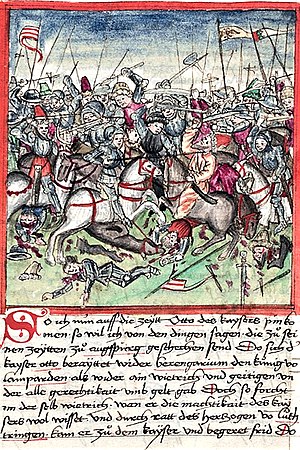The battle on the river Lech ( German: Schlacht auf dem Lechfeld , Hung. Augsburgi csata ).
| Battle of the Leh River | |||
|---|---|---|---|
| Main Conflict: Hungarian Invasion of Central Europe | |||
 | |||
| date | August 10, 955 | ||
| A place | Lech river, near Augsburg ( Bavaria ) | ||
| Total | The victory of the Germans | ||
| Opponents | |||
| |||
| Commanders | |||
| |||
| Forces of the parties | |||
| |||
On August 10, 955 German troops led by King Otton I defeated the nomads invading Central Europe - the Hungarians (Magyar tribes, who later settled on the territory of modern Hungary) and permanently stopped their devastating raids on Christian countries. The battle took place on the Lech River near Augsburg .
The battle was preceded by a siege and attempted assault by the Hungarians of Augsburg. The king gathered 10,000 horsemen, but still inferior to the barbarians in numbers, although he outnumbered them with weapons — heavy German cavalry against light Hungarian. Victory was achieved, first of all, due to discipline. Surrounding the Germans, the Hungarians dismounted and began to rob the carts , which allowed Otto I to destroy the dismounted, and then strike at the main horde. Chasing the fleeing, the German troops did not violate the order, remembering their small numbers. The Germans were captured by the Germans, including one of their leaders, Lele , and the survivors were cut off their noses and ears and sent to their maimed ones.
The battle of Lech is often called the " birth of the German nation " ( "Geburt der deutschen Nation" ). [2]
Notes
- ↑ Data are in accordance with Wolfgang Hebold: 50 Klassiker: Siege und Niederlagen, Gerstengerg Verlag, 2002; Augsburger Stadtarchive und Adi Briegel: Bayrisch-Schwäbische Geschichte, Verlag für schwäbische Landeskunde, 1959
- ↑ Lechfeld - Geburt der deutschen Nation